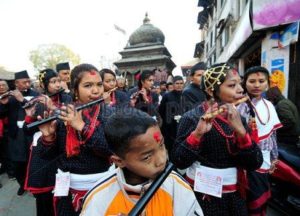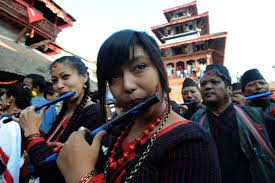The Nepal Mandal Dapha festival 1136 (Nepal Sambat) is set to begin from the last week of October this year.
The festival is a competition of the Dapha Bhajan, a traditional genre of music of the Newar community of the valley.
Cultural expert Om Dhaubadel said the competition will start from the day of Kaag Tihar. (Kaag Tihar is one of the four auspicious days of Diwali in Nepal, Sikkim). The competition is scheduled to be held every Friday and Saturday for the next two months.
Dhaubadel said, “This competition was organised in order to protect historically significant cultural songs and preserve the identity of the Newar community.
A group of cultural experts from Patan, Bhaktapur, and Kathmandu have organised the festival and will judge the competition. Dr Satya Mohan Joshi is the president of this committee.”
Dapha is a genre of cultural music which requires traditional musical instruments such as the Lalakhi Baja, Ta Baja, Jhyalincha, Punga, Sankha, and Khing, and accompanies traditional dances of certain Newar communities such as Kha Pyakhan, Devi Naach, Lusi Pyakhan, Bhalu Pyakhan, and Bhairav Naach.
Different Newar communities from different places have their own cultural songs. Every night, the elderly pray to the gods and ancestors through Dapha songs in different patis and pauwas near temples.
“In a Dapha Bhajan, two groups sing the bhajan in the support of one another. The Dapha Bhajan was a means of entertainment during the Malla regime,” said Dhaubadel.
During the competition, participants will be given 40 minutes, and an extra 10 minutes to complete their performances.
Participants have the creative license to incorporate as many songs and dances in the 50 minutes given to them, informed Dhaubadel. More than 100 groups are participating in the competition.
A participant Laxmi Bhakta Duwal, 83, said a performance of the Dapha Bhajan can be from 20 minutes to more than 60 minutes long. “It is very difficult to sing Dapha songs as it requires a wide vocal range and the lyrics are incredibly difficult to understand,” she said. A minimum of three songs are sung in a performance of the Dapha Bhajan.
The Dapha Bhajan is slowly dying out as younger generations lose interest in the traditional art form. The organisers expressed hope that the competition would help in preventing the loss of this traditional culture.
Another participant in the competition Ram Krishna Mulguthi, 44, said, “In my youth, I was the youngest member of our Mulakhu Dapha.
Nobody my age was interested to learn this genre of music. There was a time when there were more than 80 members, but now there are only 11 members.”


